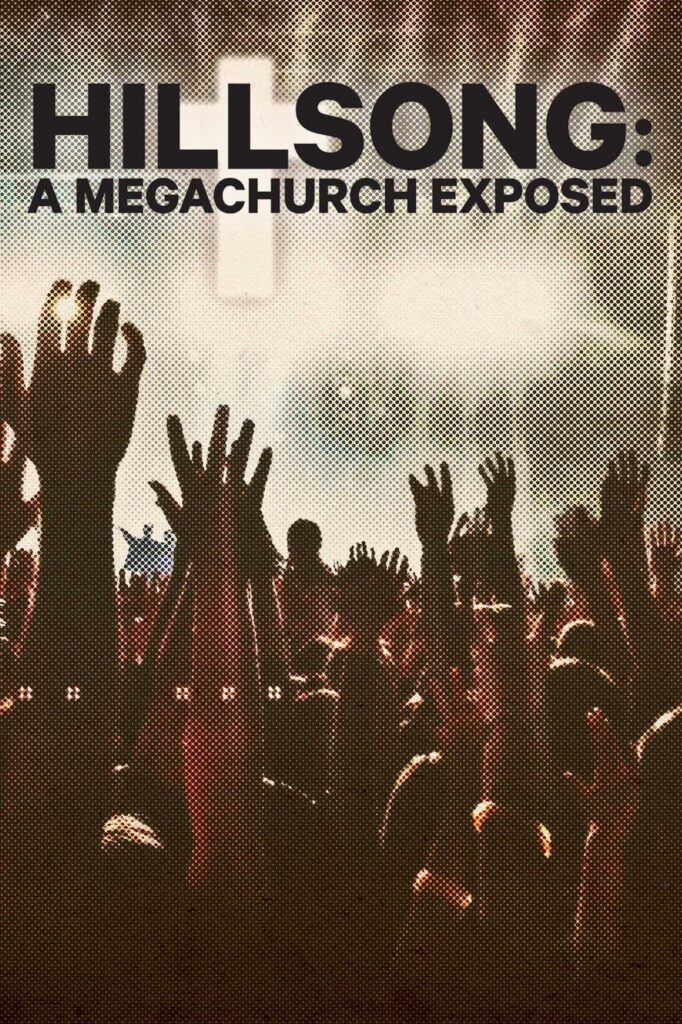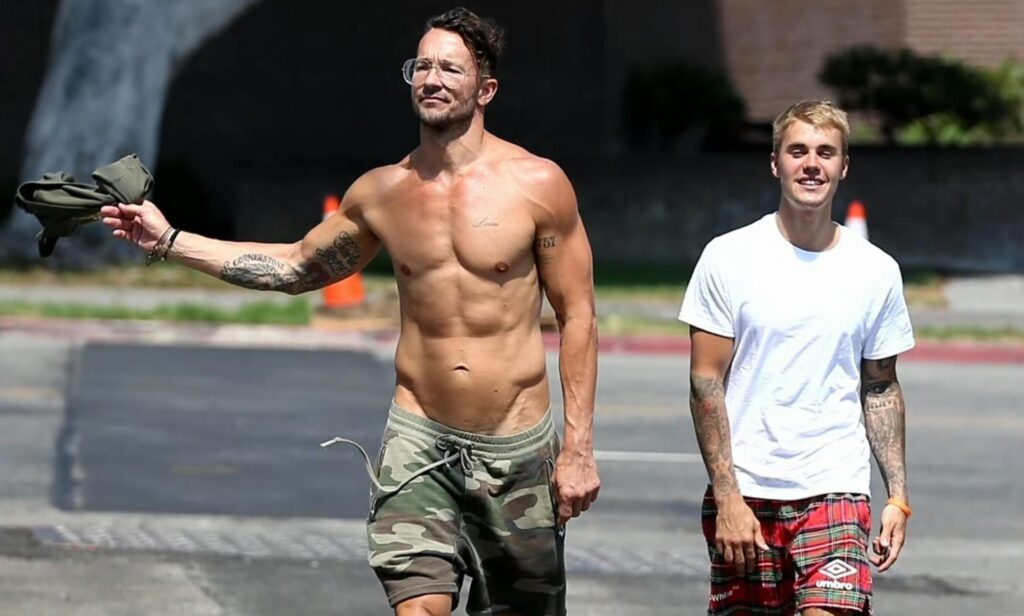Exploitation and Abuse at Hillsong Church
A review of the docuseries Hillsong: A Megachurch Exposed
 In one scene from the three-part Discovery Plus docuseries, Hillsong: A Megachurch Exposed, founder Brian Houston announces during a service, “I watched them, some of the teams were here at 5:00 a.m. Volunteers. Not being paid for it, 5:00 a.m. They got here at five o’clock in the morning, they’ve been here all day, they’ll still be here when we all go home at night. There are people here since the day this church has started that have done that every single weekend of their lives and we can thank God for them because they’re amazing. They’re amazing. But I also believe that that’s the kind of attitude that can cause people to see their own dreams come true.”
In one scene from the three-part Discovery Plus docuseries, Hillsong: A Megachurch Exposed, founder Brian Houston announces during a service, “I watched them, some of the teams were here at 5:00 a.m. Volunteers. Not being paid for it, 5:00 a.m. They got here at five o’clock in the morning, they’ve been here all day, they’ll still be here when we all go home at night. There are people here since the day this church has started that have done that every single weekend of their lives and we can thank God for them because they’re amazing. They’re amazing. But I also believe that that’s the kind of attitude that can cause people to see their own dreams come true.”
The prosperity gospel preached at Hillsong, a charismatic megachurch akin to a multinational corporation, promised volunteers blessings on Earth. Hillsong worship enticed attendees to tithe, purchase merchandise, attend conferences, and financially support the church by facilitating the necessary buzz on social media. In 2020, Hillsong had congregations on six continents and claimed an average weekly attendance of 150,000—a global enterprise that required what volunteers repeatedly describe in the docuseries as “free labor.” One former volunteer from the church’s Los Angeles location stated, “protecting the Hillsong empire” was tantamount.
The docuseries admirably attempts to demonstrate what sacrifice by Hillsong volunteers entailed and the toll it took. The strength of Hillsong is its inclusion of testimonies by several survivors of various forms of abuse spanning New Zealand, Australia, and the United States that trace the history of Hillsong’s founding, expansion, and harm. However, viewers are given little insight into how the church’s organization and theology resulted in systemic emotional, spiritual, and sexual abuse wrought by leadership.
The unearthing of scandals since the church’s peak in 2020 have led Hillsong’s empire to crumble. In March 2022, two women accused Brian Houston of inappropriate conduct of a sexual nature while he was on leave from ministry duties to fight a criminal charge of concealing child sexual abuse perpetrated by his late father, Frank Houston. Subsequently, on March 21, Brian Houston resigned from his position as global senior pastor. As a result of these public crises, pastors at many U.S. locations—nine of 16 as of April 2022—are leaving what they call Hillsong’s global family, one that we learn was rotten and dysfunctional at its core.
***
Frank Houston served as the superintendent of the Assemblies of God in New Zealand until the early 1970s. After moving to Australia, he founded a church called the Sydney Christian Life Center in 1978. Houston also engaged in predatory sexual behavior, detailed on camera in Hillsong by survivor Brett Sengstock. Frank Houston sexually abused Sengstock for several years in New Zealand, from the ages of seven to twelve. The allegations against Frank surfaced in 1999 and were promptly covered up by his son. Brian Houston claimed that he stopped his father from preaching, but a recording provided in the docuseries of Frank sermonizing years later proves otherwise. Before his death in 2004, Frank offered Sengstock monetary compensation, a sum of ten thousand dollars, which he notarized on a McDonald’s napkin. When Sengstock called Brian Houston for the money two months later he was told, “you know, it’s your fault all this happened, you tempted my father.” Ultimately, Frank Houston was accused of sexually abusing nine boys.
Hillsong spends a good portion of its third episode detailing the sexual abuse perpetrated by Frank and covered up by Brian, and importantly affords Sengstock valuable time to tell his story in his own words. We catch glimpses of Brian Houston’s 2015 testimony before the Australian Royal Commission into Institutional Responses to Child Sexual Abuse, where he admits that he knew of his father’s crimes. But the docuseries does not describe the organizational systems within the New Zealand Assemblies of God, the Sydney Christian Life Center, the Australian Christian Churches—the Australian branch of the Assemblies of God where Brian Houston was the national president from 1997 to 2007—or Hillsong, that afforded Frank and Brian Houston the authority to cause so much damage as their congregations expanded. The connections between sexual abuse and exploitive labor practices are left unexplored as we learn a brief history of how Brian Houston founded his own church in Sydney and developed his vision for global expansion.
In the docuseries, Tanya Levin, a former Hillsong Sydney member and author of People in Glass Houses: An Insider’s Story of a Life In and Out of Hillsong, describes how Brian Houston’s vision for the Hills Mission Life Center in Sydney—an Assemblies of God church he founded with his wife Bobbie in 1983—changed after he traveled to the United States in 1989. During that trip, Houston met with U.S. megachurch pastors who preached a prosperity gospel to great success. After Houston returned from his tour abroad, Hills Mission Life Center began marketing the church through its worship music by the band Hillsong. In the 1990s, Hillsong started licensing its music to Christian organizations around the world, creating an exponential source of revenue to such success that, by 2001, the church took the band’s name. Kelsey McKinney, a journalist and author of God Spare the Girls, speaks to the impact of Hillsong music on American evangelicalism. Hillsong’s Christian themes and emotional registers would infiltrate other churches, such as hers growing up, because they produced music that shifted with cultural trends. The goal was to stay current. Swells of emotion and momentous chord progressions were orchestrated to make listeners feel something. New songs were introduced live during Sunday services so that corporeal worship and the testing of new music to sell became synonymous. Levin contends, “Music is weaponized for whatever the church’s needs are, which are financial.” An article by McKinney details how the musicians writing and performing under the Hillsong name are exploited, earning little money of their own whenever worship songs are replayed.

(Image source: Spotify)
Rather than making disciples, Hillsong generated consumers for their music, merchandise, conferences, and college. In order to create consumers, the church needed workers to support Houston’s vision for Hillsong, best summarized in his 1993 mission statement: “The Church that I see is a Church of influence. A Church so large in size that the city and nation cannot ignore it. A Church growing so quickly that buildings struggle to contain the increase…I see a people so kingdom-minded that they will count whatever the cost and pay whatever the price to see revival sweep this land.” As Hillsong volunteers describe how they were both inspired and exploited by Houston and the church, connections between varied forms of structural abuse—sexual, spiritual, economic, and emotional—become clearer. Young boys were groomed for sexual abuse by Frank Houston, and church volunteers were groomed for economic abuse by Brian Houston, culminating in traumatic emotional and spiritual abuse.
One of the many church volunteers interviewed on camera is Noemi Uribe, who served at Hillsong Boston. Her testimony is particularly moving, in part because she is seated in a church pew. As she describes what attracted her to Hillsong, Uribe speaks with warmth, “Everybody could wear what they want. There was diversity onstage and among the people in the pews. Hillsong is a safe space for them. I could be whoever I wanted, people didn’t care, this was going to be a place that I could call my home.” Uribe then pauses, bows her head, and tears up, “I need a minute…it hurts to look back because I was so into it, I was so embedded in it, I wanted to believe it. Now that I look back, I’m like damn, they’re trying to manipulate you into receiving and accepting the abuse that they’re causing. It was traumatic and it could have taken my life if I had stayed a minute longer.” Uribe’s story illustrates the emotional, spiritual, and material toll of the “free labor” Houston described as a blessing. But the docuseries does not explore how “diversity” was accepted or represented, other than when volunteers were needed to put on the necessary show to attract attendees and financial support. Although “come as you are” was one of Hillsong’s mottos, adorning signs in the church’s locations, one former volunteer says that the church was not LGBTQ-affirming.
Uribe shares: “[Brian] Houston tends to say little lingos and that’s the lingo for the year. So, there had been the lingo of, ‘Do you believe we get to do this?’ And that became the biggest thing that volunteers would say every Sunday. You’d be exhausted, you’d be tired, people would have panic attacks in the break rooms, and everyone would just look at each other and say, ‘Wow, do you believe we get to do this?’ And it was repeatedly said, and you start to believe it. Now that I look back, damn they’re trying to manipulate you into receiving and accepting the abuse that they’re causing.” Houston’s lingos encouraged as much “free labor” from as many volunteers as the church could enlist in a cycle of alienated labor that became entangled with their relationship to God. The lines between “consent” and “coercion” were strategically blurry.
Uribe describes this tension well: “It hurts to look back, because yeah, I was used. They took someone who was vulnerable, who wanted to just fit in and find a family, who was in a new city, someone who wanted to thrive in this thing that I had been raised in, which was church. And they used that, so that they could get more people through the doors that look like me, and who are going through the same things as me, to get the money out of them, and the seats out of them, and more volunteers out of them. More free labor. And if I were to go back and tell myself that, I probably would disregard what I was telling myself, because I was so into it, I was so embedded in it. I wanted to believe it.”
Through testimonies such as Uribe’s, we glean that Houston’s vision for Hillsong was used to inspire volunteers to exhaust themselves for the sake of church growth at all costs. On camera, we do not hear Uribe expand on the details of what she describes as abuse and the subsequent trauma that resulted. But the language of “family” perpetually used in relation to Hillsong’s global empire along with the refrain of “free labor” often employed by church volunteers, suggests links between sexual, emotional, material, and spiritual harm, even if they are not directly connected in the docuseries. Systems of exploitation saturated all aspects of Hillsong’s ministry. The sexual abuse perpetrated by patriarch Frank Houston remained hidden and unaccounted for by his son Brian, who in turn persuaded volunteers to devote their lives to the church “family” beyond a healthy point. Uncompensated labor on behalf of Hillsong drove volunteers like Uribe to feel not only used but also betrayed. They maintained a veneer of joy and blessing for the sake of the church’s expansion and brand, while they endured work abuses by their “family” behind the scenes of services.
The sociologist Arlie Hochschild defines “emotional labor” as “the work, for which you’re paid, which centrally involves trying to feel the right feeling for the job. This involves evoking and suppressing feelings. Some jobs require a lot of it, some a little of it… Teachers, nursing-home attendants, and child-care workers are examples. The point is that while you may also be doing physical labor and mental labor, you are crucially being hired and monitored for your capacity to manage and produce a feeling.” While “emotional labor” has been broadly applied in ways that Hochschild did not intend, her point is to direct attention to the work of managing one’s own emotions for the sake of a job, such as being a flight attendant, whereby employees are expected to smile and be friendly to customers, even in stressful situations.
Hillsong volunteers, such as greeters welcoming congregants or in various roles on the worship team, provided emotional labor on Sundays; however, this labor was unpaid. They worked on sound, lighting, and music to produce feelings of joy and induce tears of catharsis among attendees expecting a concert-like atmosphere and experience, while they had panic attacks out of sight in the break rooms. A former New York City Hillsong Lighting Director, Brando Kress, stated: “I’d spend the equivalent of a work week at Hillsong for free. At the end it was like, I don’t have the capacity, you guys are going to have to hire a venue guy to run your lighting because it’s just, I’m exhausted and you guys aren’t going to pay me.” The response? “But we don’t want to pay somebody, can’t you train some more people up.” This “free” emotional labor was expected and extracted not only from “willing” volunteers at various church locations, but students at Hillsong’s college in Sydney, where they paid tuition for the privilege of serving.

(Hillsong worship service. Image source: Richard Termine/New York Times)
Hillsong College student Elizabeth Curet describes how a check she sent to the school in Australia to cover her tuition and living expenses was lost, as she moved from her home in the United States to attend. Instead of empathy, she was met with apathy. Curet says that Hillsong, “didn’t want to hold any responsibility for your feelings, your own experiences, because that’s your journey with God.” She was told that “we all go through suffering, persecution, let it go so that you don’t harbor any resentment, any bitterness, be grateful that you’re here,” as she went hungry. Another Hillsong College student, Yolandi Bosch, shares that all attendees were asked to sign a non-disclosure agreement. Many students did not realize that they were signing away their right to talk with family and friends about their curriculum and daily schedules at the school. “When you begin to break down the money aspect of college” says former student Bailey Krawczyk, “that’s when even more of these cult-like tendencies start to show because of the sheer amount of free labor they were extracting from all these kids. You’re required to serve the church at the weekend, you’re required to serve at the college at the chapels, and you’re required to serve at your internship. I was editing their programs for free, as part of my ‘college’ (laughs). Someone’s practicum for the semester would just be cleaning the church. But it was all at the end of the day adding up to free labor.” The non-disclosure agreements supported this exploitation because they could be used against any student who complained.
***
As I watched Hillsong, I could not help but think of my book about the rise and fall of Mars Hill Church in Seattle. Biblical Porn: Affect, Labor, and Pastor Mark Driscoll’s Evangelical Empire portrays the emotional, spiritual, and material price of Driscoll’s vision of church expansion at all costs. There are theological distinctions between Hillsong and Mars Hill—the former is a charismatic church that emphasizes spiritual gifts and God’s blessing, and the latter was a New Calvinist church that emphasized man’s utter depravity and God’s wrath. However, as Hillsong volunteers repeatedly used the language of “free labor” to describe working full-time in different forms of ministry, I had flashbacks to my research. Whereas the atmosphere at Mars Hill was one of fear tinged with hope, the vibe at Hillsong, based on the brief clips of worship offered in the docuseries, is joyful. Reenactment footage shows the jubilant raising of arms and the collective effervesce of dance. Nevertheless, joy is a productive instrument of emotional manipulation, according to Hillsong insiders and pundits. Hillsong and Mars Hill were dependent on volunteers’ willingness to sacrifice jobs with salaries and time with their families in order to serve their church’s mission to conquer territory, accrue cultural capital, and turn a profit. Houston and Driscoll used distinct methods to rally their troops and build their brands, but they shared similar goals.
It is easy to pay too much attention to celebrity pastors when considering a megachurch’s popularity and decline. The docuseries’ biggest weakness is that it devotes too much time to Hillsong’s most famous pastor, Carl Lentz, who led the New York City location from 2003-2020. Lentz’s meteoric rise in fame and the affair that led to his downfall take up half of the first episode and most of the second. It is difficult to get a sense of the style and content of Lentz’s preaching, despite the amount of screentime spent on his story. We see him strutting onstage and hear that “sexual purity” was a common theme during his sermons. During his time at Wave Church in Sydney prior to arriving in New York, Lentz imposed “dating rules” that included no kissing within the first year of courtship and never saying “I love you” before becoming engaged. Jaclyn Hayes, a longtime Wave Church congregant, testifies to a counseling session with Lentz during which she was shamed and forbidden to see her boyfriend after they confessed to having sex once. Haynes married the next man that she had sex with, to avoid another pastoral confrontation.

(Carl Lentz and Justin Bieber. Image source: IMDB)
Lentz hypocritically leveraged sexual purity to exercise control, but his focus was on building his brand. He boasted of celebrity friends on Instagram until he became one himself, attracting social media followers and pop stars in the pews. He was known for his oversized glasses and sex appeal, which has a history among American preachers, particularly Pentecostals, but that history is unexplored in the docuseries. To be sure, there is discussion of neo-Pentecostalism and the prosperity gospel by way of experts with insider and outsider perspectives on Hillsong. Elle Hardy, author of Beyond Belief: How Pentecostal Christianity Is Taking Over the World, appears in the docuseries to talk briefly about the history of the movement and doctrine such as the Seven Mountain Mandate, the idea that Christians are to take over the seven mountains or “spheres of influence” in society—education, religion, family, business, government, arts and entertainment, and media. However, the connections between cultural, institutional, and theological problems at Hillsong are implied rather than examined in the docuseries. Instead, there is too much footage of Lentz the Instagram star and adulterous husband, too many flashes of the infamous pic of a shirtless Lentz with chiseled abs and shorts hanging low next to Justin Bieber. Hillsong falls into TMZ-style celebrity gossip journalism when it includes the “gotcha” reveal of Ranin Karim, the five-month long mistress of Lentz, as an interviewee. Karim’s story does little to illuminate the structural problems within the church. The docuseries could have connected distinct yet overlapping harms suffered within the Hillsong “family” by delving into a volunteer’s story of sexual abuse that she endured while working as the Lentz family’s nanny.
Importantly, varied interview material demonstrates the contrast between the experiences of Hillsong congregants who simply attended Sunday sermons and the volunteers who felt that Hillsong was their home and family. Those who idolized Lentz as a celebrity pastor were not hurt in the same way as those who looked to him as their pastor. Dale Smith, a former security team member at Hillsong Connecticut, asks whether Jesus would be given a seat in the VIP section at the front of the stage; he also notes that Lentz never stuck around after his sermons to speak with people. Testimonies to myriad forms of systemic abuse at the hands of Hillsong’s leadership belie the docuseries’ suggestion that the gravest problem plaguing megachurches today is the influence of social media and “mainstream” celebrity culture, as a recent podcast by Christianity Today on the rise and fall of Mars Hill also suggests.
Ben Kirby, who began the Instagram account preachersnsneakers to raise questions about the money spent on pastors’ designer wardrobes, spoke of friendly interactions with Lentz. However, in his last scene on camera, Kirby was visibly upset: “If you believe that people actually have a chance of like, going to hell, and you’re worried about how your ass looks on Instagram, it’s just so obscene.” Kirby begins a repetitive motion on both hands that looks like a nervous tic and calming technique; his thumbs bend the knuckle of his first three fingers in unison. “I don’t know why I’m getting emotional about it. If you believe all this is true, and you’re treating it like a game, that seems pretty foolish. And you’re basically saying you don’t appreciate or respect how grave the stakes are.” The bodily movements of interviewees are at times more telling than their words—the hunching of shoulders, clench of a jaw, welling of tears—speak to experiences of fear, intimidation, and trauma, not apart from but entangled with feelings of joy, hope, and belonging.
Noemi Uribe provides the most fitting conclusion to Hillsong: “My story to them doesn’t matter, because I was another volunteer. I was another person walking through the doors and tomorrow they’re going to have someone else who’s going to be lonely and vulnerable and fall into that trap and it’s going to be a vicious cycle.” So long as churches sacrifice people for the sake of expansion, they cannot hope to be healthy. At a time when the language of “groomer” is weaponized by right-wing pundits and GOP politicians against anyone they consider a political enemy, Hillsong demonstrates that the Christian Right needs to look within if it truly cares about protecting children from sexual predators. Patriarchs of purported “church families” are more likely to be abusers, or guilty of covering up abuse, than those they demonize. Preying on the vulnerable, the docuseries shows, inevitably occurs when ambitions for power matter more than caring for people.
Jessica Johnson is a Visiting Scholar of Religious Studies at the College of William & Mary and a Sacred Writes/Revealer Writing Fellow. Her ethnographic study of the rise and fall of Mars Hill Church in Seattle, Biblical Porn: Affect, Labor, and Pastor Mark Driscoll’s Evangelical Empire, was published by Duke University Press in 2018.
***
This article was made possible in part with support from Sacred Writes, a Henry Luce Foundation-funded project hosted by Northeastern University that promotes public scholarship on religion.